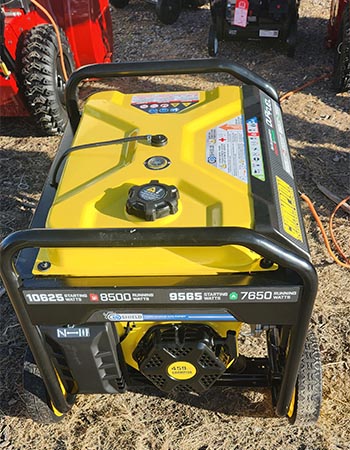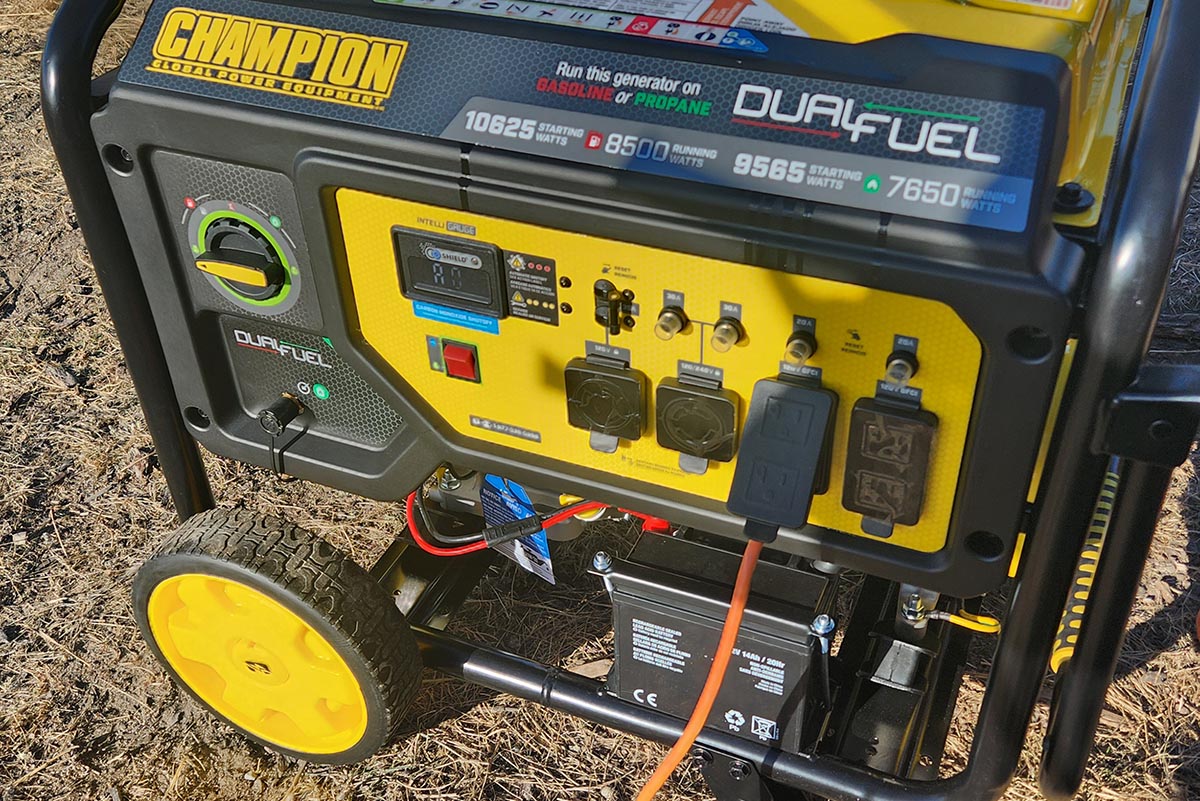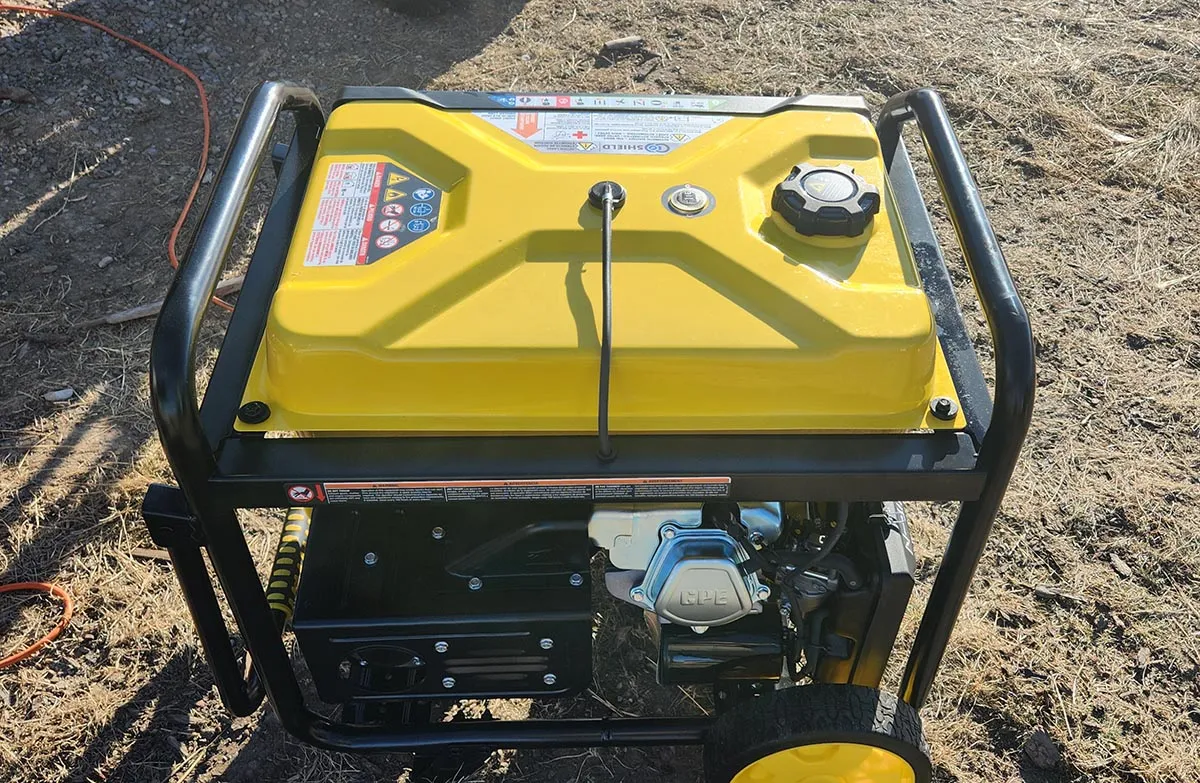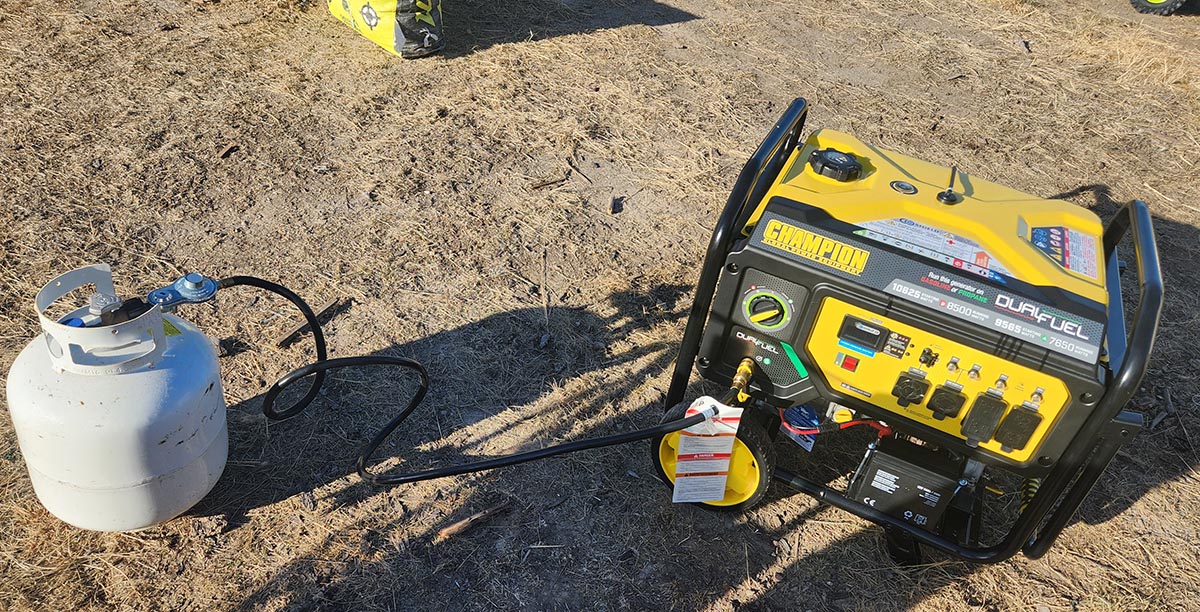We may earn revenue from the products available on this page and participate in affiliate programs. Learn More ›
Portable generators have incredible utility and bring power to places that are otherwise off-grid. I’ve tested several portable generators, using them to run home appliances and jobsite power tools and also to support a travel trailer’s electric refrigerator, lights, water pump, and heater. While each one I tested supplied power, few could run as long or deliver enough power for higher-demand tasks.
When evaluating generators, I monitored them for power surging and performance during 3- to 4-hour cycles. I analyzed each based on ease of use, starting ability, fuel options, outlet types and numbers, portability, and overall performance. The Champion Power Equipment 8,500-watt dual-fuel generator performed exceptionally well, delivering a consistent stream of power without surges or breakdowns. It was a favorite of mine, and for users with significant power needs, it might be just the right fit.
Champion 8,500-Watt Dual-Fuel Generator With CO Shield: At a Glance

Rating: 9.2/10
SPECS
- Fuel options: Gas and propane
- Gas wattage: 10,625 starting and 8,500 running
- Propane wattage: 9,565 starting and 7,650 running
- Engine: 459cc, 4-stroke
- Outlets: One 120V AC 30A locking, one 120V/240V AC 30A locking, four 120V AC 20A GFCI
PROS
- Multiple outlet and power options to meet a variety of needs
- Folding handle and sturdy wheels make it easy to move on flat ground
- Dual-fuel options allow it to run on gasoline or propane
CONS
- Too heavy for a person to lift and maneuver off the ground without help
- Best for users with bigger needs; more power than needed for small jobs like charging batteries
Get the Champion 8,500-watt dual-fuel generator at:
- Lowe’s for $1,099.00
- The Home Depot for $1,099.00
- Northern Tool + Equipment for $1,229.99
- Acme Tools for $1,099.00
What is the Champion dual-fuel generator?
Designed to supply off-grid electricity, the Champion 8,500-watt dual-fuel generator is a heavy-duty power producer. It can run efficiently on a 7.7-gallon tank of gas for 10 hours with a 50 percent load. A standard 8-pound propane tank will provide 5 hours of runtime under the same conditions. The option to draw on either fuel allows users to carry whichever they find most affordable or convenient.
At 8,500 watts of running output, this generator provides more than enough power to charge batteries or run multiple items. It can simultaneously support an air compressor and heat pump or power-hungry appliances such as an air conditioner, water heater, or clothes dryer. While users will want to check the draw of individual power sources to avoid overloading the generator, each power source has a circuit breaker that will trip in the event of an overload.
This Champion generator features six outlets, including one 120V AC 30A locking, one 120V/240V AC 30A locking, and four 120V AC 20A GFCI. It fires right up with a simple ignition switch and has a digital display that shows runtime, volts, and frequency. For safety, it also has a built-in carbon monoxide auto shutoff.
Generator Setup
When it comes to setting up the Champion generator, all it takes is installing the wheels and base legs to the body. At 209 pounds, this beast is heavy, so users may want a strong friend or two to help move it off their truck bed or trailer. I put mine down on a set of blocks, which helped me gain ground clearance for leg and wheel installation. The process was easy thanks to the wheel kit’s hub and cotter pin system, and I was able to attach the legs in minutes using flange bolts and lock nuts.
The folding handle came assembled, and once the wheels were on, I could move the generator around my shop easily. I positioned it on a level surface and completed the final three steps, which were:
- Filling the oil reservoir with the included oil to the appropriate level;
- Filling the gas tank with high-grade, ethanol-free fuel; and
- Connecting the two battery cables.

Generator Operations
With everything assembled, oiled, and fueled, it was time to learn the controls and test run the generator for a half hour. I wanted to get a feel for how it sounded and the running condition before placing a load on the unit. It also seemed like a good idea to break in the motor for a bit before putting it to work.
The controls were so easy to use that I felt as if I was missing a step. I double-checked the manual, and it turns out this unit is just really easy to start and run. It has a dial that points to the fuel types, so I turned it to gasoline, hit the ignition, and fired it right up. I was very impressed with this generator’s simplicity and first-time startup.
Next, I turned off the engine and hooked up the propane line. I turned the dial to propane, and again, it fired right up and ran with zero hesitation or issues.
Beyond the starting process, the only thing left to do was to connect a power supply. As with all other setup aspects of this generator, this process was intuitive, and the digital power readings were clear and highly visible.
Generator Performance
After connecting power, the Champion generator immediately began producing energy. I started my tests by running an extension cord to a drill and then a circular saw. The generator ran both without any hesitation. I then connected to a portable camping refrigerator, which ran with zero surging. Gaining confidence, I hooked up my travel trailer’s 30-amp cord to the 120/240 outlet. I left it running while going about my business for a few hours, and it powered all the appliances in my trailer without issue.
After running the generator on gas for a half day, I switched to propane and did a 3-hour run on the travel trailer. Again, it powered all my appliances very smoothly. The load wasn’t excessive (I ran my fridge, a space heater, and lights), but it was certainly enough to give the generator a mild workout. If there was anything on the trailer with greater power needs, it would have likely tripped the trailer breaker and not the generator. It didn’t trip any breakers, however, and I wouldn’t hesitate to run bigger power loads in the future.
My tool, appliance, and travel trailer tests didn’t come close to running through the generator’s gas tank, either. In the 4-hour test, I used around one-quarter of a tank. A heavier load would increase consumption, but the manufacturer’s stated 10-hour runtime seems very realistic. For contractors and jobsite workers, it can easily handle a full shift without the need to refill the tank.
Is the Champion dual-fuel generator worth the money?
For an 8,500-watt generator, a price point of just over $1,000 is reasonable—there are many similar models priced within $100 of the Champion.
What makes this generator’s value especially apparent is its dual-fuel option. Most other models in this price range only run on gasoline and don’t have the secondary propane fuel line. A few others don’t have wheels or stabilizing legs and are instead cased in tubing that creates a frame. While it would be easy to lift with a few people helping, this design is difficult for one individual to move. Moving a generator is more necessary than some might think, especially when it’s being used as an off-grid power source or on a site where various extension cords must be reached. Having a generator on wheels makes a difference for longer periods of use and solo project-doers.
After completing my tests of the Champion Power Equipment 8,500-watt dual-fuel model, it was clear that this generator is very well built and has a great-running engine. For users like me who need to run bigger appliances or power-heavy equipment, this unit is worth the money. For those who have smaller electrical draws, other options that weigh and cost less might be more suitable.

Should you buy the Champion dual-fuel generator?
Whether or not you need a dual-fuel generator depends on how you use the power sources. Having access to multiple fuel options is great when fuel prices change or when one option isn’t readily available. This flexibility also helps maintain the generator’s performance in varying weather conditions, as gasoline performs very well in the cold while propane is super efficient in hot climates.
The Champion Power Equipment 8,500-watt generator is ideal for someone who needs a hard-working option with long runtimes. It’s great for contractors who need to power tile saws, charge tool batteries, and plug in a variety of equipment types. It’s also ideal for use at off-grid cabins and campsites if a boost is needed to run appliances, charge large battery banks, or to simply keep on hand as an emergency energy source.
If you need a high-quality generator with plenty of power and the ability to perform in different climates, this Champion dual-fuel machine is an excellent option.
Where to Buy the Champion Dual-Fuel Generator
Get the Champion 8,500-watt dual-fuel generator at:
- Lowe’s for $1,099.00
- The Home Depot for $1,099.00
- Northern Tool + Equipment for $1,229.99
- Acme Tools for $1,099.00
Meet the Tester
Zach Lazzari is a freelance writer splitting time between the great outdoors, travel, and DIY projects ranging from camper builds to home renovations and maintenance. His home base in Montana is the perfect testing grounds for winter products and snow equipment. With over a decade of professional writing experience, he also covers a variety of other projects and maintenance topics for BobVila.com.


